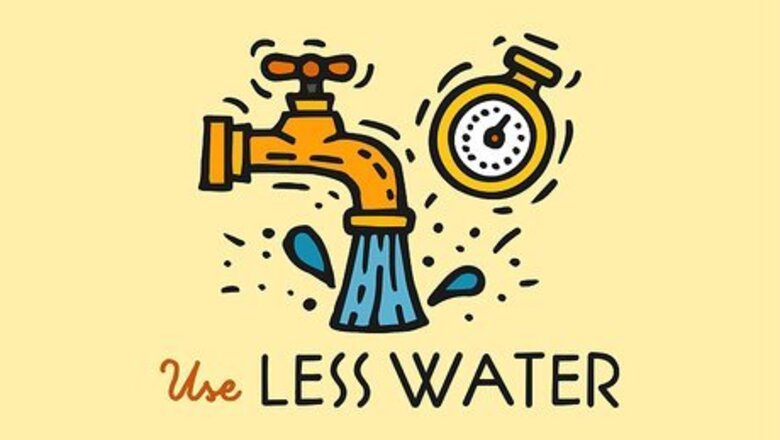
views
Use less water.
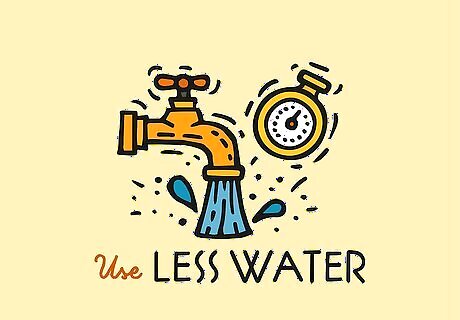
Taking shorter showers is an easy way to make a big impact. If you shorten your usual shower time by just 1 minute, you’ll save 3,000 liters (800 gallons) of water a year! It helps to turn off the faucet when you’re brushing your teeth or washing your hands, too. Be sure to keep the water off until it's time to rinse! You can also: Wash full loads of laundry or dishes instead of half loads if you're doing chores.
Drink tap water instead of bottled water.
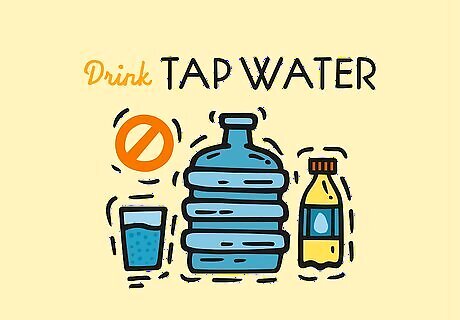
Plastic water bottles waste tons of energy and create pollution. Plus, most plastic bottles can’t be recycled so they just end up in a landfill! If your parents buy bottled water, ask them to stop and explain why plastic bottles are bad. If you like carrying water with you, get a reusable bottle and fill it with tap water instead. If you don't like the taste of tap water, ask your parents to buy a faucet filter or filtered pitcher for the fridge.
Turn off lights and unplug devices.
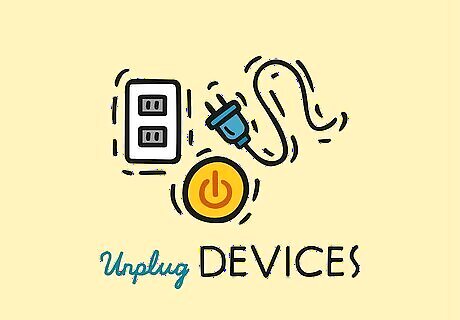
Electronics keep using energy when they're plugged in. Devices with remotes, like TVs and gaming consoles, are always using power—even when they’re off! To avoid wasting energy, unplug electronics when you aren't using them. Another easy solution: plug your devices into a power strip with an on/off switch and hit the "off" switch when you leave the room or your home. You can also: Turn off the lights when you leave a room. Adjust your screens/monitors to automatically power down. Unplug electronic devices (and their charging docks) after charging them.
Close your doors and windows.

This saves energy because it prevents hot/cool air from escaping. In the summer and winter, make sure you close all doors behind you and don’t leave windows open. Hot and cool air can escape quickly, which means your furnace or air conditioner has to work harder and use more energy. Additionally: Close your curtains in the summer so the house doesn’t get hot. Put on a sweater in the winter instead of turning up the heat. Use ceiling or box fans instead of turning on the AC.
Use less paper.
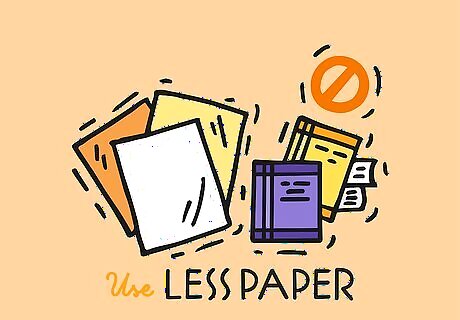
Avoid printing out things unless you really need them. It takes a lot of energy and trees to make paper products! Instead of buying new books, borrow some from the library or read e-books. You can also ask your parents to buy recycled notebook and drawing paper for school and artwork. Find fun alternative to gift wrap or re-use gift wrapping paper.
Walk and bike more often.
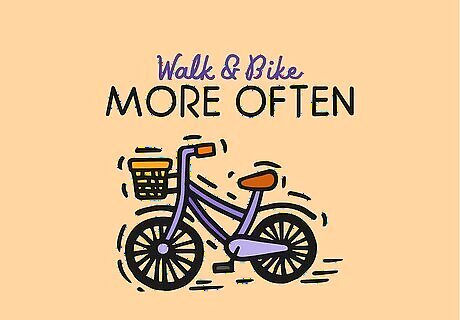
Cars are one of the biggest sources of greenhouse gas emissions. "Greenhouse gases" are gases that block heat from escaping the planet, which makes the planet too warm. If you’re going somewhere close, walk or ride your bike instead of getting your parents to drop you off. If it’s too far to walk or bike, take the city bus or train. You can also: Carpool to school and events with your friends. Go shopping and run errands in the same trip instead of individual trips. Talk to your parents about buying a hybrid or electric car.
Recycle or reuse items instead of trashing them.
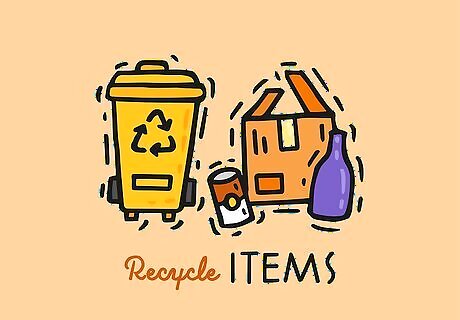
Generating less trash saves energy and prevents overflowing landfills. Talk to your parents about taking advantage of your local or city recycling program so paper, plastic, newspaper, glass, and aluminum cans don’t end up in landfills. When buying new stuff, look for products with zero waste or eco-friendly packaging. Try these strategies, too: Bring reusable grocery bags to the store. Reuse plastic food containers. Shop in thrift stores instead of buying new stuff. Donate clothes to thrift shops when you outgrow them.
Ask your parents to switch to CFL or LED light bulbs.
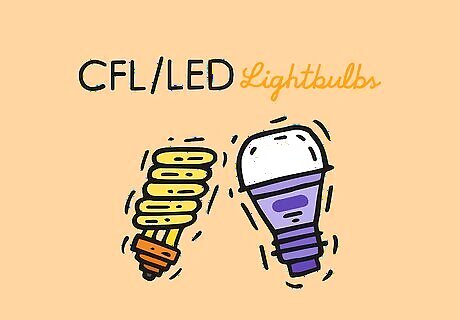
CFL and LED light bulbs are super energy efficient. They use 75% less energy than incandescent bulbs and last about 10 times longer! Your parents can buy them at your local hardware, grocery, and discount stores.
Eat less meat and dairy.
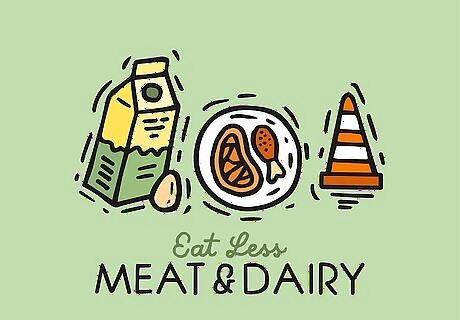
Changing your diet may seem minor, but it helps a lot. The meat and dairy industries create a lot more pollution than people realize. In fact, livestock accounts for about half of the world’s greenhouse gas emissions! Talk to your parents about serving vegetarian or vegan meals occasionally. Use almond or soy milk in your cereal instead of cow’s milk. Ask your parents to buy meat replacements like tofu.
Buy from local farmers markets and businesses.
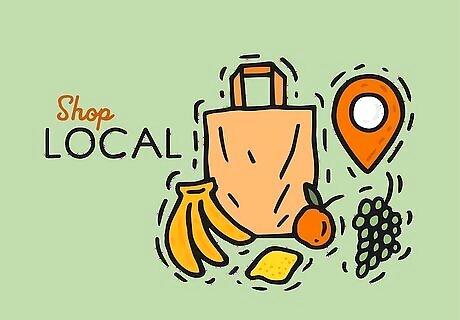
Shopping locally is energy-efficient and supports your community. Transporting fresh produce to your local grocery store releases a lot of pollution into the air! Sticking with locally-grown and in-season produce helps prevent that. Asking your parents to shop at local farmers markets for produce is another great idea. Remember to take your reusable shopping bags with you! When you need to buy big stuff, like new desks and bookshelves, ask your parents to check out what your local craftsmen have for sale.
Talk to friends and family about climate change.

Spread the word so everyone can do their part to help the planet. It’s a bit scary to think about sometimes, but global warming is getting worse, so we have to take action now! Sharing information with your friends, family, and classmates can help a lot. You can also: Ask your parents to help you weatherize the house so it’s energy-efficient. Write a letter to the editor of your school newspaper to raise awareness.
Share information about global warming on social media.

Social media makes it easy for you to reach a lot of people at once! Share articles, links, and infographics with your friends and followers to educate them about climate change. Encourage reposting so you can reach as many people as possible. You can also use social media to connect with other kids who are interested in helping the environment. For example, check out youth-led environmental groups on Facebook. Be sure to use environment-related hashtags on Twitter and Instagram. For example: #environment, #sustainability, #climatechange, #ecofriendly, #savetheplanet
Start a recycling program at your school.
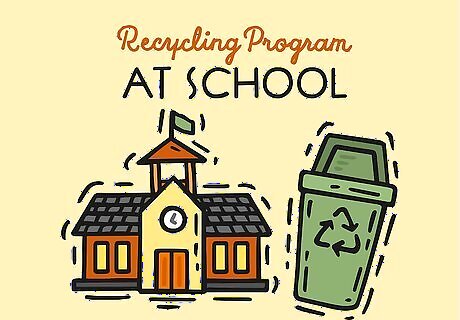
Ask your administrators how they're handling waste operations. If your school doesn't have a recycling program in place, talk to other concerned kids and teachers about helping you start one. Then, hang posters around your school to educate others and support the program. You can even form a Green Team with other students to help you spread the word! If your school already has a recycling program, look for ways you can improve it.
Write letters to your government officials.

Ask your parents to help you find their names and addresses. Then, you can send letters, postcards, or drawings to your mayor, government representatives, or even the president asking them to do something about global warming. Jane Goodall Jane Goodall, Conservation & Animal Welfare Advocate Make a difference by advocating for your beliefs. "Change happens by listening and then starting a dialogue with the people who are doing something you don't believe is right."

















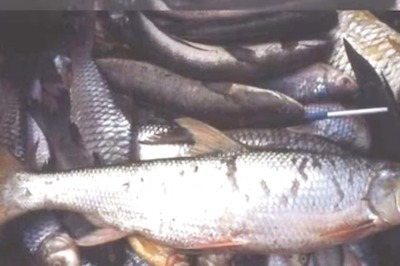


Comments
0 comment